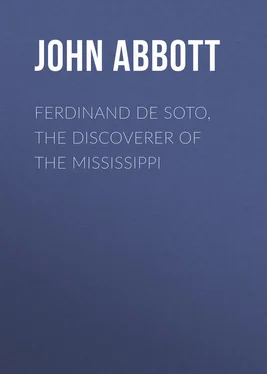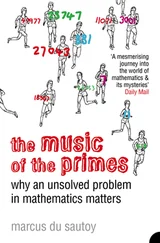John Abbott - Ferdinand De Soto, The Discoverer of the Mississippi
Здесь есть возможность читать онлайн «John Abbott - Ferdinand De Soto, The Discoverer of the Mississippi» — ознакомительный отрывок электронной книги совершенно бесплатно, а после прочтения отрывка купить полную версию. В некоторых случаях можно слушать аудио, скачать через торрент в формате fb2 и присутствует краткое содержание. Жанр: foreign_antique, foreign_prose, на английском языке. Описание произведения, (предисловие) а так же отзывы посетителей доступны на портале библиотеки ЛибКат.
- Название:Ferdinand De Soto, The Discoverer of the Mississippi
- Автор:
- Жанр:
- Год:неизвестен
- ISBN:нет данных
- Рейтинг книги:3 / 5. Голосов: 1
-
Избранное:Добавить в избранное
- Отзывы:
-
Ваша оценка:
- 60
- 1
- 2
- 3
- 4
- 5
Ferdinand De Soto, The Discoverer of the Mississippi: краткое содержание, описание и аннотация
Предлагаем к чтению аннотацию, описание, краткое содержание или предисловие (зависит от того, что написал сам автор книги «Ferdinand De Soto, The Discoverer of the Mississippi»). Если вы не нашли необходимую информацию о книге — напишите в комментариях, мы постараемся отыскать её.
Ferdinand De Soto, The Discoverer of the Mississippi — читать онлайн ознакомительный отрывок
Ниже представлен текст книги, разбитый по страницам. Система сохранения места последней прочитанной страницы, позволяет с удобством читать онлайн бесплатно книгу «Ferdinand De Soto, The Discoverer of the Mississippi», без необходимости каждый раз заново искать на чём Вы остановились. Поставьте закладку, и сможете в любой момент перейти на страницу, на которой закончили чтение.
Интервал:
Закладка:
Hernando Pizarro was silent, indulging only in a malignant smile. It was not safe for him to provoke De Soto to a personal rencontre. Francisco Pizarro smothered his chagrin and very adroitly availed himself of this statement, to commission De Soto to take twenty-four horsemen, such as he might select, and accompanied by an Indian guide called Filipillo, go forward to the Peruvian court.
Both of the Pizarros seemed quite relieved when the sound of the departing squadron of brave cavaliers died away in the distance. De Soto, during the whole of his adventurous life, seems to have been entirely unconscious of the emotion of fear. During his residence in the camp of the Pizarros, he had exerted a powerful restraint upon their ferocious natures. He had very earnestly endeavored to impress their minds with the conviction that they could not pass through the populous empire of Peru, or even remain in it, if their followers were allowed to trample upon the rights of the natives. So earnestly and persistently did he urge these views, that Pizarro at length acknowledged their truth, and in the presence of De Soto, commanded his men to abstain from every act of aggression.
But now that De Soto was gone, the Pizarros and their rabble rout of vagabonds breathed more freely. Scarcely had the plumed helmets of the cavaliers disappeared in the distance, when Hernando Pizarro set out on a plundering expedition into the villages of the Peruvians. The natives fled in terror before the Spaniards. Pizarro caught one of the leading men and questioned him very closely respecting the designs of Attahuallapa. The captive honestly and earnestly declared, that he knew nothing about the plans of his sovereign.
This demoniac Hernando endeavored to extort a confession from him by torture. He tied his victim to a tree, enveloped his feet in cotton thoroughly saturated with oil and applied the torch. The wretched sufferer in unendurable agony, said "yes" to anything and everything. Two days after, it was proved that he could not have known anything respecting the intended operations of the Inca. It is a satisfaction to one's sense of justice to remember that there is a God who will not allow such crimes to go unpunished.
De Soto, with his bold cavaliers, pressed rapidly on towards the Peruvian camp. Very carefully he guarded against every act of hostility or injustice. Everywhere the natives were treated with the utmost courtesy. In the rapid advance of the Spaniards through the country, crowds flocked to the highway attracted by the novel spectacle. And a wonderful spectacle it must have been! These cavaliers, with their nodding plumes, their burnished armor, their gleaming sabres, their silken banners, mounted on magnificent war horses and rushing along over the hills and through the valleys in meteoric splendor, must have presented an aspect more imposing to their minds than we can well imagine.
De Soto, who had not his superior as a horseman in the Spanish army, was mounted on a milk white steed of extraordinary size and grace of figure, and wore a complete suit of the most costly and showy armor. It is said that on one occasion his path was crossed by a brook twenty feet wide. The noble animal disdained to wade through, but cleared it at a single bound.
The crowds who lined the highways seemed to understand and appreciate the friendly feelings De Soto manifested in gracefully bowing to them and smiling as he passed along. He soon ascertained, though his guide Filipillo, that the headquarters of the Peruvian camp was at a place now called Caxamarca, among the mountains, about eighty miles northeast of the present seaport of Truxillo.
After a rapid ride of about six hours, the expedition approached quite a flourishing little town called Caxas. Several hundred Peruvian soldiers were drawn up in battle array in the outskirts, to arrest the progress of the Spaniards. De Soto halted his dragoons, and sent forward Filipillo to assure the commandant that he was traversing the country not with any hostile intent, and that he bore a friendly message from his own sovereign to the king of Peru.
The kindly disposed Peruvians immediately laid aside their arms, welcomed the strangers, and entertained them with a sumptuous feast. Thus refreshed, they pressed on several leagues farther, until they reached a much larger city called Guancabama. From all the accounts given it would seem that the inhabitants of this region had reached a degree of civilization, so far as the comforts of life are concerned, fully equal to that then to be found in Spain. This city was on the magnificent highway which traversed fifteen hundred miles through the very heart of the empire. The houses, which were built of hewn stone, admirably jointed, consisted of several rooms, and were distinguished for cleanliness, order, and domestic comfort.
The men seemed intelligent, the women modest, and various arts of industry occupied their time. De Soto testified that the great highway which passed through this place far surpassed in grandeur and utility any public work which had ever been attempted in Spain. Happy and prosperous as were the Peruvians, compared with the inhabitants of most other countries, it is quite evident that the ravages of the Fall were not unknown there.
Just before entering the town, De Soto passed a high gibbet upon which three malefactors were hung in chains, swaying in the breeze. That revolting spectacle revealed the sad truth that in Peru, as well as elsewhere, man's fallen nature developed itself in crime and woe. The Emperor had also a large standing army, and the country had just been ravaged by the horrors of civil war.
De Soto was kindly received at Guancabama. Just as he was about to leave for Caxamarca, an envoy from the Inca reached the city on its way to the Spanish camp. The ambassador was a man of high rank. Several servants accompanied him, laden with presents for Pizarro. He entreated De Soto to return with him to the headquarters of the Spaniards. As these presents and this embassy would probably convince Pizarro of the friendly feeling of the Peruvian monarch, De Soto judged it wise to comply with his request. Thus he turned back, and the united party soon reached Pizarro's encampment.
Конец ознакомительного фрагмента.
Текст предоставлен ООО «ЛитРес».
Прочитайте эту книгу целиком, купив полную легальную версию на ЛитРес.
Безопасно оплатить книгу можно банковской картой Visa, MasterCard, Maestro, со счета мобильного телефона, с платежного терминала, в салоне МТС или Связной, через PayPal, WebMoney, Яндекс.Деньги, QIWI Кошелек, бонусными картами или другим удобным Вам способом.
Интервал:
Закладка:
Похожие книги на «Ferdinand De Soto, The Discoverer of the Mississippi»
Представляем Вашему вниманию похожие книги на «Ferdinand De Soto, The Discoverer of the Mississippi» списком для выбора. Мы отобрали схожую по названию и смыслу литературу в надежде предоставить читателям больше вариантов отыскать новые, интересные, ещё непрочитанные произведения.
Обсуждение, отзывы о книге «Ferdinand De Soto, The Discoverer of the Mississippi» и просто собственные мнения читателей. Оставьте ваши комментарии, напишите, что Вы думаете о произведении, его смысле или главных героях. Укажите что конкретно понравилось, а что нет, и почему Вы так считаете.












